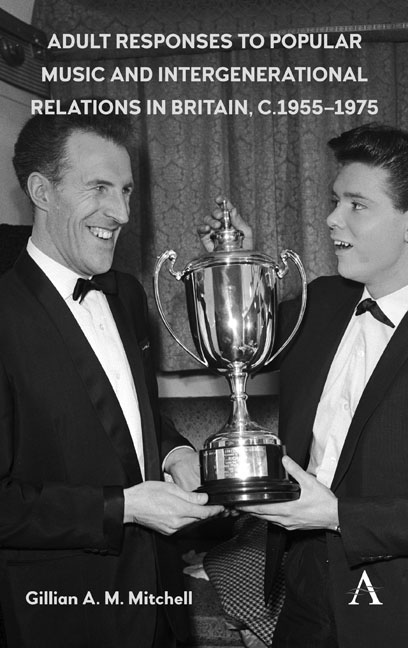Book contents
- Frontmatter
- Contents
- Acknowledgements
- Introduction
- Chapter One ‘You Go Half Way, Don't You?’ Family Life, Generational Identity and Popular Music
- Chapter Two ‘To Have Done Something’: The Christian Churches, Youth Clubs and Popular Music
- Chapter Three ‘You've Got to Be Able to Entertain People’: The Encounter between Popular Music and the Worlds of Variety and ‘Light Entertainment’
- Conclusion
- Notes
- Bibliography
- Index
- Frontmatter
- Contents
- Acknowledgements
- Introduction
- Chapter One ‘You Go Half Way, Don't You?’ Family Life, Generational Identity and Popular Music
- Chapter Two ‘To Have Done Something’: The Christian Churches, Youth Clubs and Popular Music
- Chapter Three ‘You've Got to Be Able to Entertain People’: The Encounter between Popular Music and the Worlds of Variety and ‘Light Entertainment’
- Conclusion
- Notes
- Bibliography
- Index
Summary
This book aims to contribute, in a variety of respects, to the significant body of revisionist literature on the period between 1955 and 1975, via its questioning of the widespread preconceptions concerning generational reactions to popular music during this time, and in its exploration of the manner in which these reflect changes and upheavals in specific sociocultural realms and institutions, from the churches and the family to the world of popular theatre and entertainment.
Naturally, the study is not exhaustive, and, inevitably, it has touched upon certain areas and themes which could benefit from further scholarly exploration. For instance, the manner in which considerations of gender shaped and informed reactions to popular music, though examined in some detail throughout the book, could undoubtedly be pursued with greater rigour in future studies. Explorations of race and ethnicity are not especially predominant within the work, and, once again, more meticulous dissection of the manner in which these intersect with generational attitudes to popular music would be invaluable. Both Keith Gildart and Bill Osgerby have highlighted the ability of local studies to add subtlety and nuance to broader generalizations concerning postwar British youth culture; this book has endeavoured to consider evidence from different parts of the British Isles, but there is a stronger focus on England and Scotland overall, and undoubtedly much could be gained from further study of specific component nations, regions or communities. Lastly, while the themes identified by the book were chosen for their particular vibrancy and pertinence, there is certainly room for further exploration of other vital facets and institutions of British social and cultural life, and of the extent to which they accommodated popular music. The responses of educational authorities and schools to popular music were often featured in contemporary press reports. The varied reactions to the music at which such reports hinted certainly seem, at first reading, to mirror or otherwise complement those exhibited by youth clubs and other informal educational establishments. While some schools perceived the music as encouraging unhealthy social habits, and as compromising the performance of pupils in the classroom, others were tolerant of the music, considering it a valid pathway towards more diverse musical tastes or a means of cultivating confidence and self-expression.
- Type
- Chapter
- Information
- Adult Responses to Popular Music and Intergenerational Relations in Britain, 1955–1975 , pp. 155 - 158Publisher: Anthem PressPrint publication year: 2019



